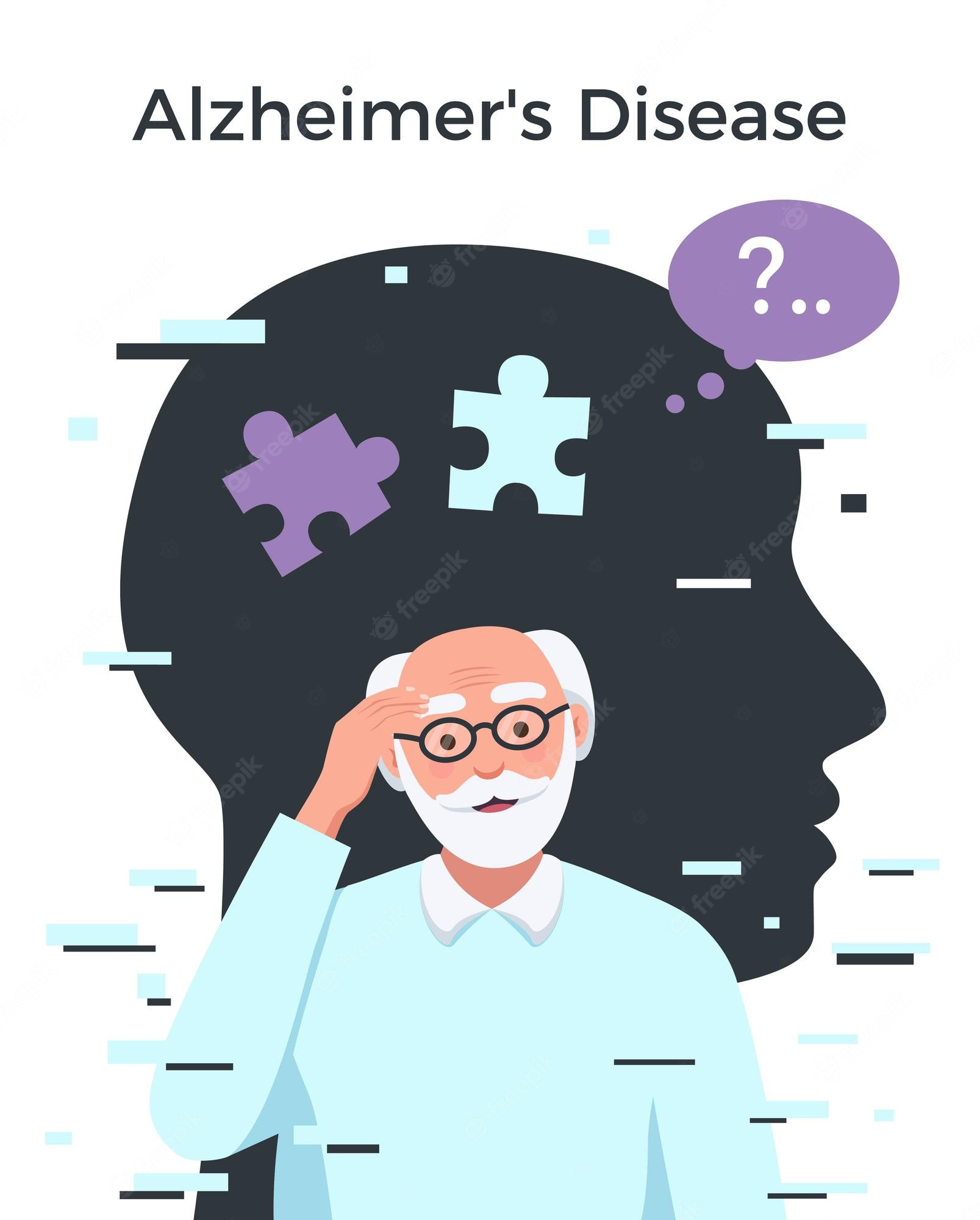Definition
Alzheimer's dementia is one of the most common types of dementia caused by Alzheimer's disease. Globally, 55 million people live with Alzheimer's dementia and other forms of dementia. Alzheimer's disease accounts for 60-80% of all dementia cases.
Dementia itself is not a disease but a general term used to describe a group of symptoms resulting from abnormal changes in the brain. These changes lead to a decline in cognitive abilities (thinking) severe enough to interfere with daily life and independent function. This condition also affects behavior, emotions, and interpersonal relationships.
Causes
In Alzheimer's disease, there is an increase in certain proteins (amyloid) inside and outside brain cells, causing a decline in brain cell health and disrupting communication between brain cells. The hippocampus, the area of the brain that is the center of learning and memory, is often the first to be damaged. This is why memory impairment is often one of the earliest symptoms of Alzheimer's dementia.
Risk factor
Risk factors for Alzheimer's dementia include:
- Age: Age is the greatest risk factor for dementia. Most Alzheimer's patients are 65 years or older.
- Family History of Alzheimer's Disease
- Genetics: Researchers know that certain genes play a role in developing Alzheimer's disease.
- Head Injury: There is a link between head injuries and the risk of future dementia.
- Heart and Blood Vessel Diseases, Diabetes, and Cholesterol
- Unhealthy Lifestyle: Poor diet, social inactivity, smoking, excessive alcohol consumption, lack of exercise, and mental disorders like depression and anxiety.
Symptoms
There are 10 early signs and symptoms of Alzheimer's dementia:
- Memory Loss Disrupting Daily Life: The most common early symptom of Alzheimer's dementia is short-term memory loss, such as forgetting recently acquired information. Patients may also forget dates or important events, ask the same questions repeatedly, and increasingly rely on memory aids like notes or electronic reminders.
- Difficulty in Planning or Solving Problems: Some people with dementia have trouble planning and following a plan or working with numbers.
- Difficulty Completing Familiar Tasks: Alzheimer's patients often struggle to complete everyday tasks, like driving to familiar places, making monthly shopping lists, or remembering game rules.
- Confusion with Time or Place: Alzheimer's patients may lose track of dates, seasons, and the passage of time. They might forget where they are or how they got there.
- Vision and Spatial Issues: Vision problems can be an early sign of Alzheimer's in some people, affecting balance, reading, judging distance, and recognizing color or contrast, which can cause driving issues.
- New Problems with Words in Speaking or Writing: Alzheimer's patients may have trouble following conversations, stop mid-conversation, repeat themselves, or struggle to find the right words and name familiar objects, sometimes calling them by the wrong name.
- Misplacing Things and Inability to Retrace Steps: Alzheimer's patients often put things in unusual places and lose items without being able to retrace their steps to find them. They may accuse others of stealing.
- Decreased or Poor Judgment: Alzheimer's patients may experience changes in judgment and decision-making, such as poor financial decisions or neglecting personal grooming.
- Withdrawal from Work or Social Activities: Alzheimer's patients may withdraw from hobbies, social activities, and other engagements due to changes in their ability to hold conversations.
- Mood and Personality Changes: Alzheimer's patients can become confused, suspicious, depressed, fearful, or anxious. They may be easily upset at home, with friends, or when out of their comfort zone.
In severe dementia, individuals will experience significant memory loss, behavioral changes, and difficulties with speech, movement, and walking.
Diagnosis
No single test can determine dementia. Doctors diagnose Alzheimer's dementia based on medical history, physical examination, laboratory tests, and characteristic changes in Alzheimer's dementia. While doctors can diagnose dementia with high confidence, pinpointing the exact cause is more challenging due to the overlapping symptoms of different types of dementia.
Management
Most progressive dementias, including Alzheimer's, have no cure. However, there is one therapy, aducanumab, which is the first treatment showing that reducing amyloid in the brain may slow cognitive decline and other functions in early Alzheimer's.
Other treatments can slowly worsen symptoms and improve the quality of life for patients and their caregivers. The medical community worldwide continues to seek better ways to manage, delay the onset of symptoms, and prevent the disease.
Complications
In the advanced stages, Alzheimer's patients may lose the ability to communicate and respond to their surroundings. On average, individuals with Alzheimer's dementia live 4 to 8 years after diagnosis but can live up to 20 years, depending on other factors.
Prevention
Certain risk factors for dementia, such as age and genetics, cannot be changed. However, research suggests that a healthy lifestyle can reduce the risk of cognitive decline and dementia by:
- Adopting a Healthy Diet
- Avoiding Smoking
- Regular Exercise
- Mental Stimulation
When to see a doctor?
If you notice one or more signs of dementia in yourself or someone you know, do not ignore them. It's normal to feel anxious or confused about these changes, but they should be evaluated by a doctor. Early detection is important to receive therapies that can improve symptoms and help maintain current abilities, maximizing independence.
Looking for more information about other diseases? Click here!
- dr. Yuliana Inosensia
What Is Dementia?. Retrieved 12 September 2022, from https://www.alz.org/alzheimers-dementia/what-is-dementia.
10 Early Signs and Symptoms of Alzheimer's. Retrieved 12 September 2022, from https://www.alz.org/alzheimers-dementia/10_signs.
Dementia. (2022). Retrieved 12 September 2022, from https://www.who.int/news-room/fact-sheets/detail/dementia.
Alzheimer's disease. Retrieved 12 September 2022, from https://www.alzheimers.org.uk/about-dementia/types-dementia/alzheimers-disease.








